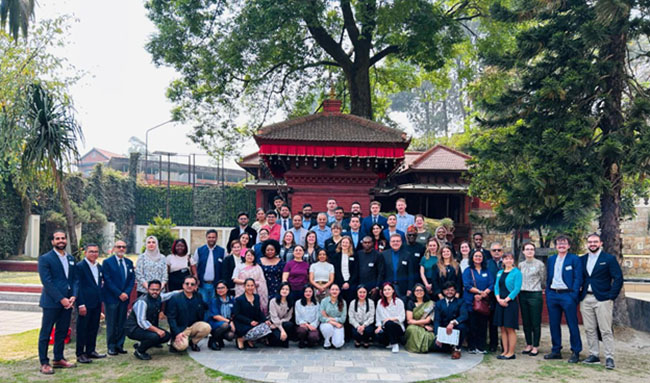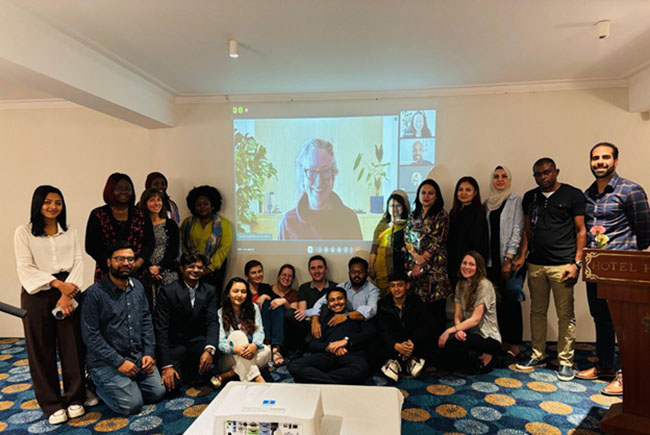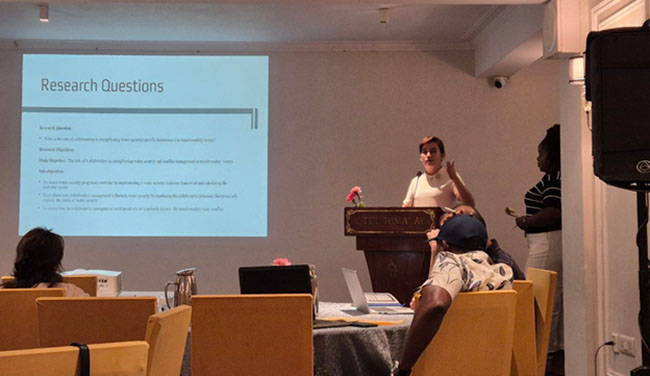No. 24 (548) April 2025
7th ANNUAL WATER AND PEACE SEMINAR
The 7th annual water and peace seminar on "Diplomacy, dialogue, discourses: exploring potentials and challenges for inclusive water cooperation" was held in Kathmandu, Nepal on March 26-27. The seminar was organized by the South Asian University (SAU) and the Nepal Institute for International Cooperation and Engagement (NIICE), with the support of the Institute of Water Education (IHE Delft) under the Cross-Regional Learning for Transformative Water Diplomacy (CROWD) project.

The main theme was different perspectives and inclusivity and participation. This seminar discussed what inclusivity and participation in water cooperation can look like from perspectives of different disciplines, practical fields, and regions. The speakers shared their experiences from civil society, government, academia, and regional organizations.
The seminar included the following seven thematic sessions:
Session 1: The role of civil society and indigenous communities in water diplomacy
In this session, participants discussed how indigenous communities and civil society groups have leveraged their power and the different ways in which they contribute to transboundary water cooperation.
Session 2: Panel debate: navigating inclusivity despite challenges-engaging a diverse range of actors in transboundary contexts.
The panel debate explored the practical realities of fostering inclusivity in challenging environments, drawing on experiences from diverse fragile regions. Speakers shared their experiences in managing stakeholder engagement and discussed key lessons learned from their on-the-ground experiences.
Session 3: Tools for participation in water cooperation
This session explored practical approaches and tools for local and public participation. The speakers shared experiences in enhancing stakeholder participation in transboundary water management from Africa, South America, Europe and Asia.
Session 4: South Asian perspectives on international water law and the UN global water conventions
The session presented global and local experiences with the mainstreaming of UN Water Convention principles in river basin agreements and discussed the practical benefits for countries of stronger engagement with the UN Water Convention and, in-turn, the value added of becoming a Party to the Convention.
Session 5: Panel debate: youth involvement – tokenism or recipe for change?
This session discussed what meaningful youth inclusion was and why youth inclusion in water cooperation was needed, drawing on their first-hand experience of being "young" water professionals from Africa, Asia and North America.
Session 6: Power dynamics across multiple governmental actors and scales
This session explored contexts of unequal power among actors and its impact on inclusivity. With a regional focus on Asia, the speakers brought diverse examples of power dynamics involving gender, neo-colonial relations, and social class.
Session 7: Potentials and challenges of inclusivity
The final session explored how inclusivity can go beyond diverse stakeholder groups to encompass tangible and intangible values through inclusion of the river and its species itself, emotional experiences and people’s stories.
The event was attended by scientists and representatives of higher education institutions, academies, government and non-government, regional and interregional, as well as private organizations and centers focused on transboundary water management and water diplomacy from Nepal, the Netherlands, Sudan, India, Jordan, Nigeria, Zimbabwe, Uzbekistan, Kazakhstan, Tajikistan, Switzerland, the USA, Hungary, and Finland. SIC ICWC was represented by Aleksandr Dolidudko and Matlyuba Rakhimova.
The two-day seminar focused on exploring the reasons for and methods of creating more inclusive water cooperation processes.
Folloing the seminar, from March 31 to April 1, the Research School on "Research Methods for Transformative Water Diplomacy" was held as part of Cross-regional learning for transformative water diplomacy project (CROWD).

The main objectives of the Research School were as follows:
- Understand and apply interdisciplinary approaches in comparative research
- Apply different quantitative and qualitative methods for data collection and analysis
- Communicate and collaborate effectively in an interdisciplinary team.
The training included such topics as:
- Social science methods for data collection
- Qualitative interviews and focus group discussions
- Discourse analysis and discursive techniques
- Critical discourse analysis
- Narrative analysis
- Qualitative data analysis.
Matlyuba Rakhimova gave a presentation in which she shared her experience in conducting scientific research and discussed research methods in technical disciplines.
